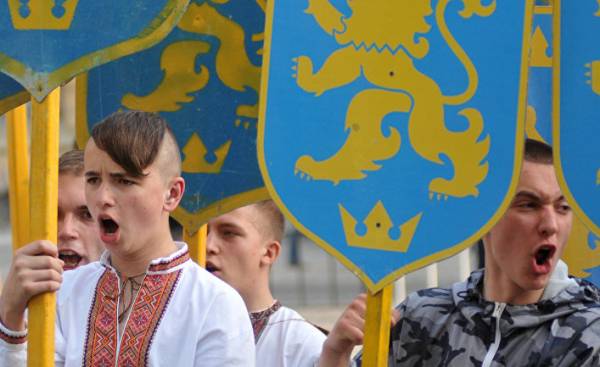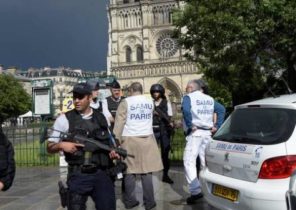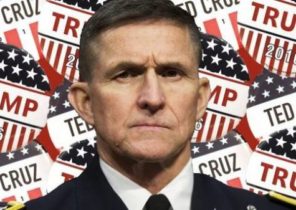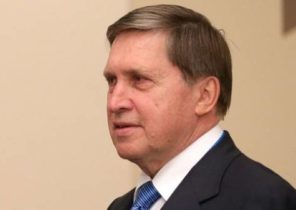
Famous Ukrainian historian and publicist, doctor of historical Sciences, Professor of the Ukrainian Catholic University Yaroslav Hrytsak in an interview with “Apostrophe” told how the state system began to “take the offensive”, because Ukraine has lost time for reform, why the European crisis is good, what chance gives Ukraine a loss of control over Crimea and Donbas, what may be lurking behind de-communization, and what rate their wars did Vladimir Putin.
“Apostrophe”: We are now in Lviv, so the first question — how do you evaluate the current situation in the city? As Lviv is affected by the problem situation with the garbage?
Yaroslav Hrytsak: Lviv was, is and will remain a very important city from the point of view of political struggle in Ukraine. If there is something important about to happen in Ukraine, it first must happen in Lviv. That in Lviv there was a party “Self-help”, a new political model, which is built on the principle of open access, is a symbolic proof of that. The principle of open access lies in the fact that all processes must pass the relevant contest or competition, then the party will have the right direction. And so we have all the political entities the old one, just renamed. Because this Lviv the experiment is very important. But to influence the situation in a country such parties should be not one, but 5, 10 or 15, then our life will be different, and we understand that MPs ‘ not to love, but, at least, not to hate, as it is now.
I think what happened in Lviv, is an attack not on me or Lvov, is a blow to the system, which not only has not passed to the principle of openness, but rather regrouped and moved to the Pacific offensive. You know who started this blockade, and by whom it is controlled? For me it is a sign that the country went in a strange direction. We’re behind the restart. And the launch of the new system will begin only when there is a transition to open access, when there will be an open competition for the position, when it will be transparent judicial system will work when finally the party building and the like.
— And where is the movement in the other direction will lead us?
— Will lead nowhere. Instead of reforming this country, to run it, our system goes slowly on the offensive. The main thing for me, why is she going on the offensive — this is not reform, and the struggle for political power in the next parliamentary and presidential elections.
— Going back to your thesis, Lviv political experiment, do you think that in Lviv people are more conscious?
Galicia is an Austrian creation, where the way of life and political system were different. On these lands, not just civil society was created. The power of a lot of things that society was consolidated. Not only raised him, but where’s the financial help. The authorities decided that since there are many problems, these problems independently she decides, and delegates to local authorities. And the more of the city developed, the easier it becomes power itself.
— No wonder the Magdeburg law in Ukraine began its history with the Galician cities.
— Magdeburg law came first. But the idea of all to delegate the right to self-government continue in Ukraine went from Galicia. And, interestingly, it engendered in the future and the very idea of Parliament. It has become a mechanism of political struggle. Once there is a political struggle, then we must have some electorate to have the electorate, it is necessary to have a reserve to a reserve Fund, it is necessary to have a Constitution. This twisted mechanism. And this mechanism is preserved even after 100 years, of a foreign power: the Polish, Nazi, Soviet. This mechanism is extremely difficult to break because it is very stable. Because of this, the lions is a very atmospheric city, a city in Ukraine, unfortunately, is no more.
— What do you mean when you say atmospheric?
— Here is a simple example: if you go to Lviv to work, the speed of your movement is slowed down with every step, because you always meet a friend; you had something to ask, he will ask you out for coffee. Institutionally, the city is very densely built up. You understand, the number of tram lines, the number of seats in the theatre, in the cafe at one of the resident lions had no equal in this space, even in comparison with China of the XV century, Lviv was more developed. If we take the figures of Newspapers per capita, behind only the lions from St. Petersburg, and Warsaw, Moscow was not even mentioned then. Therefore, whenever something in Lviv is important, it’s not because he handsome but because we have this tradition maintained. Obviously, every power that wants to have an impact, should the city to do something. Authorities very important to have the lions as a foothold in the next election. So now they are trying to clean up the area from possible competitors.
— Do you power such a sweep now?
— While it is possible, as you can see. The ratings of the party, the city government began to fall, and the government sees that it works. But we must understand that the problem with waste is a political problem. The government can not resolve the situation in the East of the country, the government can not divide the territory with Tymoshenko and the Radical party, so the garbage problem became a political blackmail, such a political quest. I don’t want to say that I know well how things work in “Self help”, I’m not campaigning for the Garden, no, this is about structural things. I would rather agitate for what the country has to do some steps towards normality, and normality means that we need to follow the rules of the game.
I can’t imagine such garbage siege in Paris, Berlin, or even in Seville. When the problem becomes political, it is an indication that something is not normal in this country. This is not a red light, but yellow, understand? There’s something very serious is done, and I as a resident of the city it’s a shame that this is done with us. The point is not only in Lviv, but the fact that the country is a legacy of the Soviet Union. Very much of what she has is a legacy of the Soviet infrastructure. These structures are in many cases not been repaired, has not improved for 25 years. And garbage problem is the same hereditary problem, because cities are growing.
— That is the system is rotten?
— Not that rotten… She could exist in this condition for a long time, but it is a condition of survival. And survival is a state of stagnation. Instead of this system to change, it transformed into a tool of political struggle. And me today, it’s unsettling, because I believe that the revolution in Ukraine has ended, but the results are only partially achieved. The main fortress, which was supposed to attack, remained motionless. Where it leads — I don’t know, but I’m guessing that in the next two to three years, the political life would be the struggle over who will divide the power among themselves. In fact, an unofficial election campaign has already started a year ago.
— A long time in a lobby spoke about early parliamentary elections, I think, is that possible?
— It will not work, because certain decisions have already been taken a year ago — namely, who will participate in this election. Maybe even a little more than a year ago. And, again, the fact that such decisions are made, and no one knows about them, shows once again that we live in a closed space.
— And how the public should respond to such a closing of space power?
— The public needs to shout if she cares. If she doesn’t care, she will not scream. I don’t know why now mostly silence. I would say that this set of reasons: fatigue, and war, and in General the desire to live comfortably. But the responsibility will fall on the government, because in such situations the government bears responsibility for the country. The whole history of reforms says that the power of their restarts. Society is never by itself cannot restart, it can only pressure. I think that to some extent, the society will press on, because journalists and the media, and society is now going, I want these things to discuss. But society can’t just push and win, because all the levers of change are in power. These levers need to take. And for this it is necessary to have a political class that is willing to come to power that has the political will and can pull the plane from the peak of the situation.
But I’m not saying blame only the government. The state must be subordinated to civil society. And now it lives in a beautiful bubble of itself. A significant number of public institutions closed in on themselves. There are, of course, part of society, which this is not true, it is a normal volunteering, and thank God that they do. But society must step outside this bubble and give political creed, because if this political power is unable to do this, it must be done by a new political class.
— And where there should be a new political class?
— It should give rise to a civil society. But so far, we see that these civil projects showed no viable long-term political projects. Therefore, the situation in Ukraine stalemate: the government does not want, and society can not.
— Do not you think that the government is more and more is the principle of usurpation? Therefore, the society can not.
— Yes, the government gathers power, sterilizes the process. And I wouldn’t mind if the power of this tool used in order to reform the country, for example, because the reforms often have resistance. I wouldn’t mind if the power thus pushing society. But we see that government is doing for some other purpose — to save power. Such a stupid tautology. So the situation is stalemate. We’ll see where it leads.
Already a month has passed since the entry into force of visa-free regime of Ukraine with the EU. In your opinion, can this decision really be taken as an element of a rupture of relations with Russia?
— As a historian I can tell you that the construction of the state, especially the successful state, is never complete without a migration. For example, Poland could hardly so well developed in the 90-ies, if not there was a migration of poles to Western countries. Poland was not such a closed, luckily, as the Soviet Ukraine, for example.
Migration is always a certain capital. But at the same time, migration sometimes is the tragedy for many people for those who leave and those who remain. Grandparents never see the grandchildren, or they will see it, but can’t talk, because the children speak the other language. It is always the human drama or tragedy. But at the same time, no good deed without emigration is not solved. This is a sacrifice that is sometimes necessary to bring. If it is useful, of course. Migration means a set of habits, rules of conduct, which is then distributed. We have noticed in Lviv (don’t know if there’s one in Kiev) that drivers stop when pedestrians cross, for example. Fewer people crossing on a red light, because they lived in a more civilized country where such things are normal. Migration Bacillus of normality.
But would people back then?
— Whether to return? Probably not. I see it in my students. Those looking for a better life, will not be returned. Be that as it hard as it was, as if the illusion of the good life that they imagine, nor collapsed, but if they find comfort not returned. Ambitious but always come back. It’s one thing to be successful and rich, but one among 100 thousand, and another thing to be one of 10 or one out of 100. We have in Ukraine is not enough of honest and successful people. And so those people who come back after studying abroad, or those who have successfully started in the East or in the West, make the country better. There are other people, there are already sown field.
— You mean competition?
Here, you see — a clean field, then you go out and you’re like a pioneer, like a cowboy in a Prairie or Cossack in the steppe. For shorter term you achieve high positions and have influence. This is one plane. So ambitious will come back. And, on the other hand, now we live in a time when physical presence plays an increasingly smaller role. Now to interview me, you could with me and meet me, we could Skype chat. Physical presence does not play the same role as before. Because of this, I hope that, even leaving the country, these young people will support communication.
Because Europe has no choice but to spread to the East. Or politically, or economically — is another question, but Europe did not arise voluntarily, but from a purely pragmatic considerations. The EU is sinking, every country can not survive in such conditions if it would not be a member of something in common. With such rivals as China or the United States, European countries did not have the chance to compete separately, Europe will be able to compete only as a great community. And to the extent Europe is destined to expand, particularly to the East. And Ukraine is huge potential, huge human capital. Therefore, those people who left for the West or East, will use the fact that someone will have contacts with Ukraine.
— Europe will not get tired of Ukrainians?
— Europe is tired of the Ukrainians for a long time. But Europe was tired and most of Europe. Europe is bursting for 20 years.
— I mean, when we’re ready to join the European Union, such Union may not be.
— Yes, Ukraine will join the European Union if the European Union will still be there. You know, it’s different: the European Union is in deep crisis. But the crisis is a short formula for success in Europe. Because Europe has always been in crisis.
But the crisis in the EU is largely provoked by migration, and this is the second side of the tragedy, you were talking about.
— There are different types of crisis. Our crisis is revolution, war. In Europe, the crisis very often leads to a new outcome. That is not just a crisis, but a crisis call.
The end before beginning something new?
Yes. Everything evolves through the crisis. To break out into some new vision or paradigm, you need to get through the crisis. Europe every crisis leads to something evolutionary. The European Union by this time was already unsustainable. It is good that he stalled and that Europe is now going through this crisis, because I have hope that this new quality. Have Brakcet on the one hand, and on the other side are France and Germany. What Putin hoped that Ukraine will fall Hungary, fall of Poland, didn’t work. Remember how many said about Greece. But now we see that the processes are gone. Brakcet stopped the movement began in the other direction.
Few people remember, but Britain was a very long joined the EU, it is constantly denied, as well as Ukraine. In the world of Europe there is no such guaranteed a beautiful script. All scripts pass through a crisis. Europe has created a very pragmatic purpose, she has a pragmatic design. But this design is largely or outdated, or already so crowded that it did not go. Europe tells about the values in which in Europe there are few who believe, and even less ready to defend. And then suddenly you have a country called Ukraine, where people not only believe in European values…
And ready to sacrifice even life for the sake of these values.
Yes. This dignity, which you now won’t see in London or Paris. In Ukraine there may be some injection, because if there is a crisis, the Ukraine has a chance in this crisis. As said very aptly Timothy Snyder: “Europe is prose, and Ukraine is poetry”. You can write prose, but can be a poet. But it can combine. So Europe and Ukraine is now in the most promising areas, the crisis may find a new interchange.
— And how not to miss this moment?
— Unfortunately, we know from history that in most cases, our dreams are not realized but remain just dreams. What I like about Europe and Ukraine, it’s the fact that neither Europe nor Ukraine will not give up. There is a feeling that the game continues. While hands do not fall, the chances remain.
— Returning to the question of the severance of relations with Russia, are we ready for this? After all the years we lived shared values, the Soviet.
— I think it has already happened. Relations between Ukraine and Russia will never be as they were before. Point. And it must be admitted. This can hardly be called a precipice, but it’s a point of no return. This was especially relations of Ukraine and Russia — our country has never had open war. With the poles, it was very much, they had the image of us as the enemy, and it is being discussed now with Bandera, was Volhynia, was a battle for the lions. In the case of Russia, it was not. That is indeed a large-scale war between Ukraine and Russia was not. On the contrary, most often when there was a war, Ukraine is on their own were always the allies of Russia. And now Putin has created a situation where Ukraine and Russia are not allies — among them the war. And that’s one factor. Second — Ukraine took first Crimea, then Donbass. It is not forgotten. But even in this situation, Ukraine is in a more advantageous position. Crisis nationalities, society is becoming more or less homogeneous. This creates the conditions for Ukraine and Russia parted like ships at sea. How far it goes and how to continue — I don’t know.
— But Russia does not really let go.
— Russia can not even imagine such a scenario. War, in fact, is around the question of whether Ukraine will remain in the orbit of “Russian influence”. This is the main bet of the war. Not Yanukovych, not Donbass, not Crimea. Putin’s rejection of Ukraine in the European Union is a strategic threat to Russia’s security. And it was known after the revolution of Dignity. Putin did not give consent to the entry of Ukraine into Europe. Despite the fact that Ukraine’s Association with Europe did, in fact, does not.
— It turns out that the gap was inevitable?
— Ukraine and Russia diverge. Disagree politically, nationally, differ in their values. The difference is now that in Ukraine there is a new group of people that had not been there 15-20 years ago. It’s mostly young people, your generation, large cities, Metropolitan areas, such as Lviv, Kyiv, Odessa, Kharkiv, Dnipro and Donetsk. This new middle class, educated, who is not ready to accept any totalitarian system, whether Yanukovych, Putin and Poroshenko even. And which has the set of values, which we conventionally call European.
The famous song about Putin was founded in Kharkov in Kharkiv environment bullies. And who are these people? These are young people who have mostly higher education. I’m about this environment. This environment creates a major point of difference between the Ukraine and Russia. And the question is whether this environment is to tear Ukraine from Russia not only politically, but also holistically. It is very important, whether the environment is to break this political project. Culture, politics, Economics are closely related, it is like a gear. They cannot be considered separately. That caught the economy, it is necessary that it first caught on politically, but that the political gear is turned, it is necessary to have certain values in society. If the values will not — break the teeth. I think that was an important match — all whirled together. But now I’m a little sad to say: this mechanism is again slips. We again failed.
— And how do you explain why failed?
— Quick jerks appear only when reforms do very quickly. Because reform is possible at a time when it is possible. Ask Balcerowicz (the famous Polish reformer Leszek Balcerowicz, who is now in Ukraine, “Apostrophe”), he will tell you, as did the reforms in six months.
So we missed the time?
— Yes, we lost time. I’m not saying that we completely lost the opportunity, never in Ukraine did so much as these last three years, but there is no guarantee that we will not be able to go back. The point of no return we have not passed. This is not my opinion, it is the opinion of many experts, and not only Ukrainian. I’m sure, because the system now goes on the offensive. The next 2-3 years will still be political turbulence.
Is probably already a feature of Ukrainian politics.
It is a feature of any policy. If you go to the shell and not doing exercise, then you should do a new approach. So will this. Ukraine was very close to it was credited, but this has not happened. And now the question of a new approach to the projectile. When that happens, I don’t know. I hope that the Maidan will not, because I imagine what would happen to a new Maidan.
— By the way, it is believed that if a third Maidan, it will be more hard than the previous one, because society has become more militarized. Agree with that?
— Yes, but the chances of a third Maidan is very low. Them exaggerating. It’s, you know, all the fears and intimidation. At the time Yanukovych was several Maidan: independence tax, for example, and a lot of others. But none of them has become a real independence unless there was something else. In order for the protest movement became a mass, should something happen. This is still there today, and won’t, most likely. I say, look at the economy. The first and the second Maidan occurred on the wave of economic recovery. And this is no accident.
— And what is that?
Revolution very often begins when it becomes worse, and when it gets better. In survival mode, people understand that we need to survive, they have high hopes there. This is a complex theory. Understand, changed the nature of poverty. Now poverty is relative, which means that if I live in Lviv, I would like to live like my peers in Paris. Or if I have a car of the same brand, I feel poor compared to those who have a car of another brand. This is relative poverty. Absolute poverty we have, almost none. There are, of course, cases. But stories where people die from hunger or cold, becomes smaller. This does not mean that the mechanism for revolution is poverty is relative, not absolute. No. But this relative poverty occurs when there are high expectations when we want to have more than we have.
Some have high expectations give rise to great frustration?
— Not that frustration, the frustration is always there. Just when people have inflated expectations, then a revolution is very possible. And high expectations is possible when there is economic recovery.
— But in Russia such a revolution is possible?
— If it were possible, it already would have happened. But she was on Bolotnaya square and failed.
— A recent anti-corruption protests in Russia?
— No, in Russia it did not happen because for that to happen, also need certain political conditions. Generally speaking, if there is at least some democracy, if there is a diversity of opinions, diversity of media and everything else, then it might happen. Is happening, because there is a so-called TV button, and values are formed not only economically. This is the advantage of Ukraine. Ukraine has not succumbed to the temptation of authoritarian society. In principle, Russia in the 90-ies were in similar conditions — and there the situation was very bad, this is the horror of the population, economic difficulties, the state is in a corrupt scheme, democracy was just a cover for oligarchic schemes and so on. But Russia has become an authoritarian tenure of Putin. But in Ukraine this has led to what has formed certain rules of the game. In Russia you can always predict the election results.
— And we did not?
— In Ukraine, because there is an entirely different mechanism. I’m not saying it’s a perfect mechanism, but this is the first condition of democracy. The rules are: if today you win, then you put the opposition in jail, because tomorrow you may be in opposition. Understand what’s going on? Yanukovych was the first who tried to break this rule, he sent his opposition, his enemies in prison, and for this he was punished.
Now none of the opponents of Poroshenko, who was in the elections in 2014 and not sitting in jail. We do not have someone like Khodorkovsky, this is a fundamental difference. It’s imperfect democracy, this democracy is more like anarchy, but it is. But it will function when it becomes socialized. And for this we need to change party systems, party building, perhaps even the Constitution. While we try, there is a chance. The main thing — not to stop trying.
— You said that now Ukraine is so homogeneous, because it eliminated the Crimea and the Donbass.
Let’s say she became more homogeneous than before.
— Is it worth it in this case to fight for these territories? Try mentally to return these people?
— Always worth it, because it is a matter of international law. What we have given to these areas? This is not some abstract concepts, and discharged the years, the principles. The whole history of Europe and the world is a fight for territory, boundaries and so on. And it came no where else but in Europe. Because Europe has always been the territory on which the struggle was waged. But after the war, a new political system in which not it may happen that one European government was at war with another European state. This means, first and foremost, the principle of inviolability of borders. Secondly, all are responsible.
Why Putin does not like Europeans? Because it violated the geopolitical system that evolved hundreds of years. And Putin came in and the system broke. And broke cynical. It’s like, you know, someone builds a glass house, and someone comes along with an iron crowbar and breaks this house. Here is a good example of what Putin is doing. Putin broke the system. And he did it for Ukraine, in Ukraine. And it wouldn’t be a crime if Ukraine is not required in relation to itself, to geopolitics, to the world and Europe respect and return of these territories. Because, otherwise, it will return us all to old principles.
But how to return these territories?
— The lack of Donbass and Crimea is a tragedy, but at the same time it gives a chance to Ukraine to become homogeneous and it is better to go through the reform process. Less various disputes concerning the language regarding Yanukovych and so on. It is necessary to take advantage of the absence of the Crimea and Donbass now in order to make quick reforms. There (in the Donbas — “the Apostrophe”) and shoot, but shoot not because it is the choice of Ukraine, but because there is a war. And the second thing is to do the consolidation when the country goes to the European Union. And then I say it is not the uniqueness of the country, such a situation is often happened. We need to see what systems can be considered. It seems to me that this system of reconciliation. Reconciliation must first be renunciation from something. Such schemes very much, just have a question about the quality of these schemes. I think, unfortunately or fortunately, this return is not the subject of the coming years.
— And the Crimea and Donbass?
— Yes, we have to accept the fact that it is a long time. But this issue is not eternal. And Putin, I think, felt it too. We have to think how to reconcile (with the inhabitants of the occupied territories of Ukraine — “the Apostrophe”) and to think about it now. But the main thing for me in this situation, except that the war that shoot — what you need to keep doors open, keep the contacts not to close the door to the territories for the people who are there. We must prepare for it today. I’m not saying it’s a perfect process, but we must pass through it.
— But such actions like the blockade of the Crimea and the Donbass, as are the doors open?
— It’s something else, but Yes, it is, to a certain extent leads to the closure of the door. This is the punishment for corruption, for corruption schemes, that did not happen for that revision, which was mentioned in the beginning of the revolution. It is clear that the blockade is politically ambiguous, economically harmful. But I understand that it is a punishment for the fact that the political class has failed to come to the new circumstances, to live a new life, as they promised.
My former graduate student, who fought in the ATO, told me how put the task before you take the height you’re looking for volunteers for a long time I think to go or not to go, and behind you is riding the train, loaded with coal, you know, what does this have moral influence. Changes do not happen quickly. Changes can be quickly initiated. Need to make a window of opportunity, and further changes will have to go for decades. It is unlikely that these changes will satisfy all. Most likely, they will not even meet us, and the next generation, because this process lasts for 40-50 years. But, at least, should be based on a basic sense of justice — when some are fighting, and behind them is not the coal carriage. While this is elementary sense of justice no. You know, I am convinced that we will long to live in a state of political turbulence, where everything, even garbage can become a political game.
— You mentioned about ideology. Interesting your position on the policy of de-communization. As a historian, how do you feel about these changes?
— As a historian I want to say that this is a side effect of the revolution. In the history of the first mass renaming of cities, streets, even the calendar occurred during the French revolution. Each new regime came to power, wants to get rid of the old regime. And it is this image, a symbol. And I understand that this is the price of the revolution. I’m just very afraid that when this de-communization becomes the smoke, which we don’t see the lack of reforms. The less reforms, the more renaming. When you rename, you are not dealing with the real thing, with the characters. I’m not saying that the characters are not important. But when you’re paying utilities, you’re dealing with things that can actually feel.
I have a suspicion that the smaller the reform, the greater will be renaming. The impression is that de-communization, the renaming of streets we get rid of the Communist past. But this is a very superficial impression. The Communist past is not only symbols, it is also corruption, which in Soviet times, flourished, it is closed political life, which has always been. There are things much deeper than the question of renaming. We have a bunch of old Soviet system, which is just renamed, but in fact does not change. Of course, a lot of the old abolished, but we do not go deeper. Summing up, we can say so: with de-communization, we were more or less in order, and reform — I doubt it.







